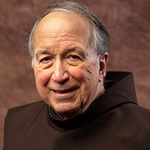Saint Colette: Leader of Franciscan Reform

On February 7, the Franciscan family celebrates the memory of Saint Colette (1381–1447), who led a major reform effort among Franciscans.
Born to a devout couple
Colette came from a comfortable working-class family in the Picardy region of France; her father was a carpenter at the Benedictine monastery of Corbie. He and his wife were a devout couple, devoted to the poor, but childless. Late in life, they prayed to Saint Nicholas and had a girl whom they named Nicolette after him. This was shortened to “Colette.”

The church of the monastery of Corbie, France, where Colette's father worked
Wanting a life dedicated to God
By the time she was 17, Collette’s parents had died, leaving her to find her way in the world. Colette knew that she wished to dedicate her life to God but had a difficult time finding a place that expressed her ideals. She tried out a community of Beguines, a monastery of Poor Clares (leading a rather relaxed life), and finally the Benedictines, but none of them satisfied her.
Expressing her conversion as an anchoress
In 1402, she chose a Franciscan friar as her spiritual director, and adopting the Franciscan Third Order Rule, chose to express her conversion as an anchoress, devoting herself to intense prayer and penance in a little cell attached to a church in Corbie. Gradually, many people came to ask for her prayers and advice.
Heeding call of Saint Francis to restore, reform Franciscan Orders
In 1406, she began having visions in which Saint Francis appeared to her, calling her to restore and reform the Orders he had founded. She gained the support of a friar, Henry of Beaume, and with his support, approached Benedict XIII, the Papal claimant living in Avignon, who was recognized as the legitimate Pope in France. Benedict was deeply impressed by her and gave her permission to profess the Rule of St. Clare and found reformed monasteries of women.
Founding 17 austere Poor Clare monasteries
She was able to establish a monastery in Besançon in 1408, living in the strictest poverty, both personal and communal. She also worked with Henry of Beaume to establish a reformed community of friars in 1412. Meanwhile, Colette continued to travel through France, the Low Countries, and Germany to establish new, austere Poor Clare monasteries, which flourished quickly under her direction. She eventually founded 17 of them. To keep them committed to reform and united in their observance, Colette drew up a set of constitutions in 1430 to regulate their community life.

The Poor Clare monastery in Poligny, France, founded by Saint Colette in 1415
Winning support of Church leaders and nobility
Colette was an impressive woman of great force of character—confident and competent. She won the support of both Church leaders and members of the nobility who became great benefactors of her efforts. After 40 years of activity, she retired to the monastery at Ghent, Belgium, where she died in 1447. Colette was canonized in 1807.

Tomb of Colette in Ghent, Belgium
Invoked by childless couples
She is invoked by childless couples desiring to become parents. The first monastery of Colettine Poor Clares in the United States was founded in Cleveland, Ohio, in 1877.

Poor Clares praying the Divine Office at their monastery in Barnhamsville, Virginia
Wisdom of Saint Colette
The Colettines still follow many elements of Colette’s constitutions.
Dominic Monti, OFM
Professor of Franciscan Research in the Franciscan Institute of St. Bonaventure University
Dominic V. Monti, OFM, is a Franciscan Friar of Holy Name Province (USA) and currently professor of Franciscan Research in the Franciscan Institute of St. Bonaventure University. He devoted the greater part of his ministry to teaching the History of Christianity, in particular the history of the Franciscan movement. He has contributed two volumes to the Works of St. Bonaventure series and is author of Francis & His Brothers, a popular history of the Friars Minor.

